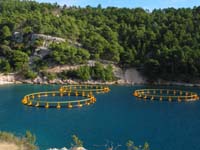|
Criteria used in the report to measure the 'risky' character of the facilities include the duration and intensity of the damage to nature, and the environmental impact of the production equipments. According to the report, several tuna farms do not meet obligatory environmental or administrative standards. But the major risk comes from the fact that the farms are often located in shallow water near the coast, where the rate of water renewal is too low to enable proper cleanup of tuna wastes and of excess baitfish used to feed tuna.
"We fully back this announcement made by the Croatian authorities", said Paolo Guglielmi, Head of the Marine Unit at WWF's Mediterranean Programme. "The position now needs to be supported by all the other relevant ministries, including the one responsible for fisheries. We urge all the Mediterranean governments to clearly state their position on tuna-farming."
Croatia is the second producer of farmed tuna in the Mediterranean after Spain. In 2001, the national production of tuna reached 3,000 tons from the eight farms present in the country*. Although a highly profitable industry, tuna farming has not been received well by the local communities in Croatia. In early February this year, a local referendum on the Dalmatian island of Vis stopped a new tuna-farming project from taking off in the port of Komiza.
The publication of this report is timely, with only a few weeks to go before the first meeting of the Working Group on Sustainable Tuna Farming in the Mediterranean**. In 2002, following a request from WWF, the General Fisheries Commission for the Mediterranean (GFCM) agreed to set up this expert group jointly with the International Commission for the Conservation of Atlantic Tunas (ICCAT). These experts will address the threats posed by tuna farming on bluefin tuna management and conservation, and the socio-economical aspects for coastal communities, in particular for traditional fishermen.
"We expect the outcome of this consultation to be the basis for a much-needed regulation of tuna-farming all across the Mediterranean," said Sergi Tudela, Fisheries Projects coordinator at WWF's Mediterranean Programme. "Wild bluefin tuna are fast disappearing because of the growing tuna farming industry’s demands. In the last 30 years the population of mature tuna has gone down by 80 per cent. We need to act urgently to save the rest."
For further information:
Chantal Menard
Communications, WWF Mediterranean Programme
Tel: +39 06 844 97 417
E-mail : cmenard@wwfmedpo.org
* Source: Croatian Ministry of Agriculture and Forestry, Dept. of Fisheries.
** The meeting will take place in May 2003 probably in ICCAT's headquarters in Madrid, Spain.
Top
|
